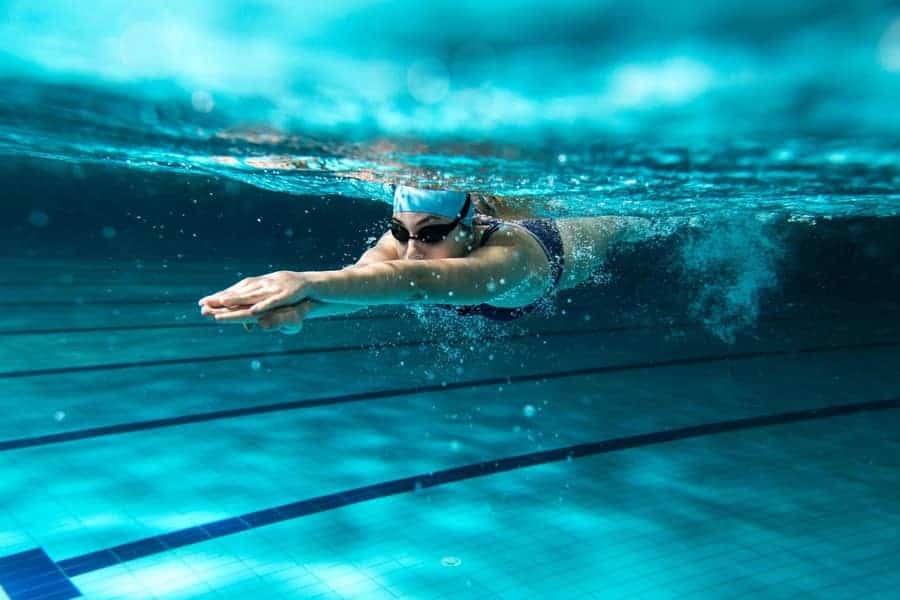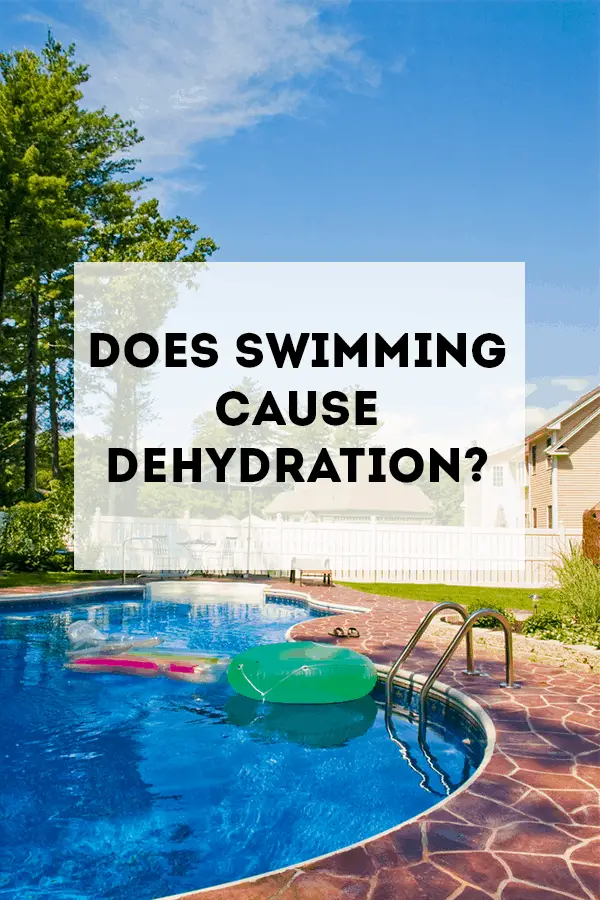
There is nothing like having the feeling of jumping into a cool pool on a sunny day, is there? As you sink down into the water, your body is immediately refreshed at once.
Does swimming cause dehydration? Swimming is a tough exercise and your body releases sweats or toxins in the water, similar to when you are running or playing another kind of sport. Although, when you are in the water, you do not observe that you are sweating. Because of that, you probably do not realize that you are getting dehydrated and you need to keep hydrating during your body sweating.
There are various questions that individuals frequently ask concerning swimming leading to dehydration. Some of these questions can be listed below:
What Causes the Dehydration?
As you continue to swim from one lap to the other, you might get amazed to discover that you are getting dehydrated. Maybe weird, but you should know that you are surrounded by and immersed in water, so, you are parched on the inside.
What you are probably going through is dehydration. That is the big word that easily explains your body has lost a huge amount of water and needs more water but the question for us is that how can our body lose water when you are in the water?
As you release toxins in the form of sweats when you swim, you need to replace them with water. Your muscles interact or communicate with your brain, which explains to you that you are thirsty and need to consume more water. Just like a racer that needs water to perform at the highest stage, swimmers need to maintain being hydrated too.
It may also be shocking to get thirsty while you are surrounded by water, but it makes sense. Rather than the body absorbing water like a sponge, you are probably even immersed in water, especially your insides where you need water to function and it is not getting enough water from the pool.
To fuel your body well enough, you need to drink enough fluids. You don’t just consume a gulp of pool, lake or ocean water because you can get sick easily by drinking water from them. Rather, you go to a water fountain, consume bottled water or probably use sports drinks like you would use in other sports.
You should also know that hydration is a key factor in swimming nutrition as well as performance. Yes, it may look weird that you need to consume a large amount of water to remain hydrated while hanging out in the pool of water.
Firstly, Why Is It Important to Remain Hydrated ?
Being dehydrated is not just bad in general but it has various effects that interfere with athletic ability. Beyond enabling you feel thirsty, it derails swim performance and causes other impacts that may include tiredness, headaches, confusion and poor judgement.
Other symptoms of dehydration include the likes of low urine output, little or no tears when crying, dizziness, dry skin, fatigue, lack of sweat, sunken eyes, irritability, difficulty swallowing foods, and even low blood pressure along with fever especially if you are seriously dehydrated.
The importance of remaining hydrated is crucial to remaining healthy and keeping the function of every system in your body, including your brain, muscles and your heart. Fluids carry nutrients to your cells, flush bacteria from your bladder and disallow constipation.
How Can You Tell When You Are Becoming Dehydrated ?
You should all know that you don’t only take water when you feel thirsty because it is really bad for the body. Why is it bad for the body? by the time you are obviously thirsty, your body must have lost lots of fluids, in the sense that you re technically dehydrated when this sensation happens.
When you are having much fluids, your urine will look light in colour, you will be able to produce tears and your mouth and will never be dry or sticky.
So, you can know or recognize the onset of dehydration if your urine is getting darker in colour and also, if your eyes are not producing enough tears and your tongue is feeling more dry.
Do You Sweat When You Swim?
The answer is yes and yes. Swimmers sweat a lot. Biochemists estimate that active adult swimmers sweat about 1 to 1.1/2 quarts per hour. In addition, a medical text supports this estimate.
In fact, further evidence of this rate of sweating comes from the fact that competitive swimmers especially distance racers, report loosing 2 to 3 pounds in an average meet. Much of this loss of weight is as a result of the sweat.
Can You Become Dehydrated While Swimming?
For some people, sweating will dehydrate you and when swimming in. After a good hard swim, leave the pool and try to get yourself dry, you will surely notice the sweating then.
For some people, swimming often makes them wee buckets especially after they have finished swimming. Well, for these kinds of people, the body is cold and it usually occurs when they swim. This particularly saves them from losing heat to the water; nevertheless it also raises the blood pressure in the body.
Should Individuals Replace All Other Beverage Choices With Water Before Going For Swimming?
Individuals should trade out other beverages with water. Rather than possessing some orange juice before going for a hard swimming, go for water. Rather than grabbing a soda before going a swim, choose water and also rather than having some tea or wine before swimming, choose water.
Sticking with water for your entire beverage needs is good start towards replacing your recommended day to day intake. Assuming you enjoy the taste of other drinks and you don’t want to sacrifice them, that is fine but make sure that you are drinking them as extra and not placing them ahead of water.
You should be aware that various other beverages are not only less hydrating than water but also cause dehydration. Maintain that in mind. You will need to account for this effect as well as increasing water consumption even more to compensate.
How Do You Prevent Dehydration When Swimming?
There is a huge talk over how much water an individual should consume to remain hydrated. The institute of Medicine recommends that men between the ages of 19 to 30 should consume at 3.7 litres of water a day while women between the ages of 19 to 30 should consume at least 2.7 litres of water daily.
Something that is familiar among us is that a thumb is usually stated for staying hydrated is to take a body’s weight, split it into two and drink as much water in ounces.
The two techniques work effectively to keep a human body hydrated; nevertheless, swimmers are required to stay conscientious of the fluids they lose while in the water. Swimmers in particular, run the risk of dehydration this way as it is very difficult to tell if they are sweating, let alone the quantity they lost.
The best way of checking your hydration levels is to check your urine. Urine that is often pale to light yellow shows adequate hydration while the darker urine shows that you are more dehydrated and you lack a huge amount of water.
For swimmers, it is also recommended that you drink at least 16 fluid ounces of water few hours before going for swimming, precisely two hours before working out and consistently rehydrate during workout to prevent any fatigue that could result from dehydration.
Swimmers are also encouraged to drink a lot of water especially after a high amount of workout, in order to replenish any lost fluids and to promote recovery of muscles.
Does Alcohol And Caffeine Cause Dehydration?
It should be noted that both alcohol and caffeine causes dehydration as both are diuretics. A diuretic is a substance that causes a high production of urine by hindering the hormone that is used to reabsorb water in the body organ (kidney) and rather changes the fluids straight into urine. This increase in urine directly rhymes with the dehydration of the human body.
The best way to prevent dehydration is to be aware of this listed signs below;
- Thirst
- Weakness
- Fatigue
- Dizziness
- Headaches
Is Dehydration While Swimming an Issue for Kids or Children?
Having a pleasant time at the pool and running through sprinklers are the significant and interesting part of summer for many kids or children. If permitted, majority of the kids would swim all day but even with all the water around, you are required to be certain that there is always a drop to drink close by.
It may look counter intuitive because they are having fun in the water but kids who spend lots of time outside the swimming pool are really susceptible to dehydration (lacking water).
According to Purva Grover, MD, Medical Director of Cleveland Clinic Children’s Pediatric Emergency Departments, kids keep sweating and losing precious fluids that will keep them hydrated in the heat.
Kids Replacing Fluids at Regular Activities
The American Academy of Pediatrics recommends kids to consume a lot of water before and during swimming. According to Dr. Grover, she says that it is very important to focus on water because drinks that are sugary such as soda or lemonade can likely increase a kid’s chances of dehydration; she also adds that flavouring water with fresh strawberries or probably slices of cucumber or lemon can really be appealing to kids or children.
To get the best results, it is advisable that kids between the ages of 9 to 12 consume 5 ounces of water every 15 to 20 minutes while youths that are 13 years or older, consume at least 32 ounces each hour.
Kids should only consume sports drink after an hour must have elapsed, when he or she have had competitive or vigorous swimming. At this time, they start to lose electrolytes, that is substances in the blood that aid keep the proper balance of body fluids. It should be noted among individuals that sport drinks only optimize hydration.
Best Solutions that Help You Prevent Dehydration
There are few important levels you can follow to cut down your kid chances of becoming dehydrated especially when they are having fun in the sun.
Prevent the Hottest Hours
Parents or guardians should try as much to keep your kid from too much time under the sun especially the hottest hours of the day. Kids can start going to the swimming pool from 4pm because it reduces the chances of being dehydrated.
Watch For High Humidity
Always put in mind that your kids intake of water on days with extremely high humidity. Kids tend to sweat more on humid days and lose precious electrolytes. Parents or guardians can also consider keeping the kids indoors especially on humid days.
Guardians Should Also Offer Breaks in the Shade
Guardians or parents should also encourage their kids to spend more time taking a break indoors or probably in the shade. Assuming you do not want soggy children bringing pool water into your house, create or design a wonderful place in the garage or basement where they can cool down and relax. In addition, you give them enough bottle waters so that they can be hydrated after losing so much sweat.
Make Water Breaks A Habit For Them
Assuming the kids have swimming laps, enable them take some sips of water especially after each three to four laps. When it gets to the recreational water time, get them out of the water each half hour or probably 45 minutes to get a drink. Easy habits similar to this will surely stick over time.
Signs and Symptoms to Know If Your Kid Is in Trouble
If your kids begin to show any of these signs and symptoms, it may mean that they are getting overheated and they need to get into the shade and consume more water. Signs such as dizziness, nausea, decreased urination and dry mouth shows that your kid or child needs to drink more water.
According to Dr. Grover, she says that assuming your kid or child showed any of these signs or symptoms of minor dehydration, then the kid needs to take a homemade sports drink that replace the fluids in a fast way. A glass of water with probably a pinch of salt and sugar can help replenish the lost fluids.
Competitive Swimming and Dehydration: Remaining Hydrated At Swim Practice
The fluid needed from competitive swimmers can be determined by factors such as age, workout intensity and even environmental factors like water as well as ambient temperatures. But firstly, there are certain rules of thumb that can aid prevent dehydration.
Firstly, water is the best hydrator when you are working out especially for a long period of time, precisely an hour or two. Even kids or children should be consuming water throughout their workouts.
For workouts that last longer than an hour or two, the AAP as well as the USA Swimming recommend that you should be including electrolytes and carbohydrates to your water. They supported it with a fact, and this is because electrolytes such as sodium and potassium are usually lost through sweat and so, they must be replaced to prevent cramping and also regulate water in the body system.
In addition, carbohydrates provide the human body with a source of fuel and so, adding a small amount of carbohydrate can make performance to improve immensely. They are also very important because once the human body burns through its carb supply, it will start burning muscle protein.
Conclusion
We all have knowledge that hanging around the pool especially in the summer is really fun for us. But a day at the pool could result to further consequences (dehydration).
The fact is that swimming is actually strenuous and similar to other sports, working out in the pool enables you to lose fluids through sweats. But dehydration caused by swimming can be prevented or avoided if you follow the right steps.


